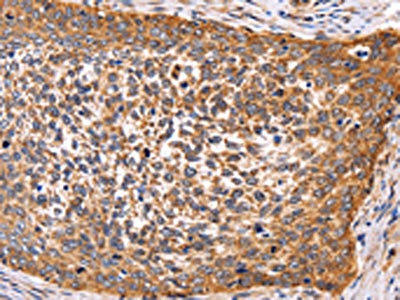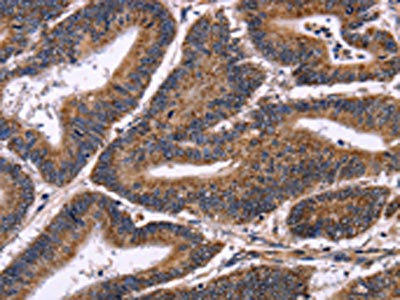Description
| Antibody Name: | AMIGO2 Antibody (PACO15422) |
| Antibody SKU: | PACO15422 |
| Size: | 50ul |
| Host Species: | Rabbit |
| Tested Applications: | ELISA, WB, IHC |
| Recommended Dilutions: | ELISA:1:2000-1:5000, WB:1:500-1:2000, IHC:1:50-1:200 |
| Species Reactivity: | Human, Mouse, Rat |
| Immunogen: | Fusion protein of human AMIGO2 |
| Form: | Liquid |
| Storage Buffer: | -20°C, pH7.4 PBS, 0.05% NaN3, 40% Glycerol |
| Purification Method: | Antigen affinity purification |
| Clonality: | Polyclonal |
| Isotype: | IgG |
| Conjugate: | Non-conjugated |
 | The image on the left is immunohistochemistry of paraffin-embedded Human cervical cancer tissue using PACO15422(AMIGO2 Antibody) at dilution 1/50, on the right is treated with fusion protein. (Original magnification: x200). |
 | Gel: 6%SDS-PAGE, Lysate: 40 μg, Lane: A172 cells, Primary antibody: PACO15422(AMIGO2 Antibody) at dilution 1/597, Secondary antibody: Goat anti rabbit IgG at 1/8000 dilution, Exposure time: 5 seconds. |
 | The image on the left is immunohistochemistry of paraffin-embedded Human colon cancer tissue using PACO15422(AMIGO2 Antibody) at dilution 1/50, on the right is treated with fusion protein. (Original magnification: x200). |
| Background: | The amphoterin-induced gene and ORF (AMIGO) family of proteins consists of AMIGO-1, AMIGO-2 and AMIGO-3. All three members are single pass type I membrane proteins that contain several leucine-rich repeats, one IgG domain, and a transmembrane domain. The AMIGO proteins are specifically expressed on fiber tracts of neuronal tissues and participate in their formation. The AMIGO proteins can form complexes with each other, but can also bind itself. AMIGO-1, also designated Alivin-2, promotes growth and fasciculation of neurites and plays a role in myelination and fasciculation of developing neural axons. In cerebellar neurons, AMIGO-2 (Alivin-1) is crucial for depolarization-dependent survival. Similar to AMIGO-1 and AMIGO-2, AMIGO-3 (Alivin-3) plays a role in homophilic and/or heterophilic cell-cell interaction and signal transduction |
| Synonyms: | adhesion molecule with Ig-like domain 2 |
| UniProt Protein Function: | Required for depolarization-dependent survival of cultured cerebellar granule neurons. May mediate homophilic as well as heterophilic cell-cell interaction with AMIGO1 or AMIGO3. May contribute to signal transduction through its intracellular domain. May be required for tumorigenesis of a subset of gastric adenocarcinomas. |
| UniProt Protein Details: | |
| NCBI Summary: | |
| UniProt Code: | Q86SJ2 |
| NCBI GenInfo Identifier: | 219521831 |
| NCBI Gene ID: | 347902 |
| NCBI Accession: | NP_001137140.1 |
| UniProt Secondary Accession: | Q86SJ2,Q4VBP6, Q7Z4A0, Q96CN8 |
| UniProt Related Accession: | Q86SJ2 |
| Molecular Weight: | 57 |
| NCBI Full Name: | amphoterin-induced protein 2 |
| NCBI Synonym Full Names: | adhesion molecule with Ig like domain 2 |
| NCBI Official Symbol: | AMIGO2 |
| NCBI Official Synonym Symbols: | ALI1; DEGA; AMIGO-2 |
| NCBI Protein Information: | amphoterin-induced protein 2 |
| UniProt Protein Name: | Amphoterin-induced protein 2 |
| UniProt Synonym Protein Names: | AMIGO-2; Alivin-1; Differentially expressed in gastric adenocarcinomas; DEGA |
| Protein Family: | |
| UniProt Gene Name: | AMIGO2 |
| UniProt Entry Name: |
| Antibodies |
| AMIGO2 Antibody (PACO07715) |
| Secondary Antibody |
| Anti-HRP Goat Anti-Rabbit IgG (H+L) Antibody (CABS014) |
| Recommended Products |
| Anti-FITC Goat Anti-Rabbit IgG (H+L) Antibody (CABS011) |
| Anti-HRP-conjugated Beta Actin Antibody (CABC028) |






